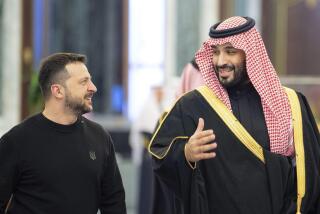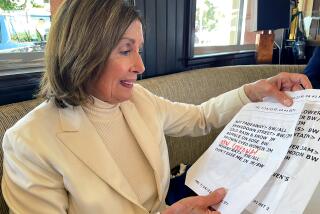Pelosi tours the Saudi ‘legislature’
- Share via
RIYADH, SAUDI ARABIA — U.S. House Speaker Nancy Pelosi on Thursday visited Saudi Arabia’s unelected advisory council, the closest thing in the kingdom to a legislature, and tried out her counterpart’s chair -- a seat no Saudi woman can have because women cannot be lawmakers.
Pelosi, the House’s first female speaker, said she raised the issue of Saudi Arabia’s lack of female politicians with Saudi government officials on the last stop of her Mideast tour, but she refrained from criticizing the kingdom over it.
“I am very pleased that after 200-plus years in the U.S. we finally have a speaker. It took us a long time,” the San Francisco Democrat said.
The Consultative Council was expanded and given more powers in 1992 as a gesture toward forming a legislature. Its 150 members are chosen by the king and advise him, and the body has the power to propose new laws for the government’s approval.
As Pelosi toured the ornate chamber, controversy continued over her meeting with Syrian President Bashar Assad on Wednesday. Vice President Dick Cheney said it was “bad behavior on her part” that she gave Assad a message from Israeli Prime Minister Ehud Olmert, which Israel later backed away from.
After the talks in Damascus, Pelosi said she had delivered a message from Olmert that Israel was ready for peace talks. Olmert’s office later issued a statement saying such talks could take place only if Syria stopped assisting terrorist groups.
Pelosi spokesman Nadeam Elshami said the speaker made it clear to Assad that if he wanted peace with Israel, he should end support for the militant groups Hezbollah and Hamas and prevent insurgents from crossing into Iraq.
A Republican congressman from California met with Assad on Thursday. Syria’s official news agency said Assad and Darrell Issa (R-Vista), a member of the House Intelligence Committee, discussed ways to improve relations between Washington and Damascus.
More than a dozen U.S. lawmakers have met with Assad in Damascus in the last four months after the Iraq Study Group recommended to President Bush that the United States hold talks with Syria and Iran to help stabilize Iraq.
More to Read
Sign up for Essential California
The most important California stories and recommendations in your inbox every morning.
You may occasionally receive promotional content from the Los Angeles Times.










